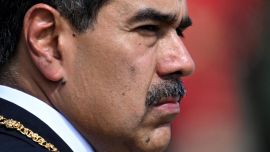Phumelele Gwala was born in a rural village in KwaZulu-Natal Province in South Africa. Her home had neither running water nor electricity. In spite of all the challenges posed by being a black woman in apartheid South Africa she received two degrees in science.
Today, after a long and successful career in education and some 25 years after the establishment of democracy in her country, she works 5,000 miles away across the Atlantic in a tall office block in Retiro, serving as her country’s ambassador to Argentina. It was in this office building that Ambassador Gwala spoke to the Times about her life, impressions of Argentina and trade between the two countries.
Tell me a bit about yourself. Where did you grow up? How did you become ambassador to Argentina?
I was born in the province of KwaZulu-Natal, in a town that used to be the capital of the KwaZulu homeland. I grew up in a rural area. Growing up I had no electricity, no water, the roads were bad, we used to walk long distances to school, long distances to catch the bus to the nearest town which was Vryheid that used to take us about three hours just to get to the nearest town. I am the first child of a family of eight children. My parents were both teachers but they were also farmers. During school holidays they would be involved in subsistence farming.
Most of my life was spent in boarding schools. I left home at the age of 11 and went to Catholic schools as a boarder up to grade 12, then thereafter I went to university. At that time in South Africa, as a black person, you were only allowed to go to three universities which were the so-called “black universities.” I went to the University of Zululand where I studied towards my science degree and later on I did a postgrad in science and botany. I am a teacher by profession; I was in the teaching profession for 16 years.
After that, I spent several years self-employed until I was appointed consul-general to Hong Kong, where I spent four years up until the end of 2016 when I was appointed Ambassador to Argentina.
What were your impressions of Argentina when you first arrived? What took time to get used to and how did it compare to South Africa, or even Hong Kong?
I found it interesting how many similarities there were between South Africa and Argentina. The culture is not that different, the climate isn’t different. Buenos Aires is such an interesting city. People are pleasant even though they may not have been exposed to people of my colour.
I am enjoying the meat, of course! All of the wines. You know we [South Africa] are also a wine-producing country so I am still trying to get used to the Argentine wine. Although Argentine wine is readily available in South Africa, I hadn’t been exposed to Malbec in South Africa before I came here.
Argentina is so rich in culture, in the arts, in its heritage. What I admire about Argentines is that they attach so much value to their culture, to their heritage.
So there is lots that we are learning from here – and there is lots that we can share.
With both Mercosur and the African Union trending towards more liberal dispositions, do you think there is potential for a Mercosur-African Continental Free Trade Area (AfCFTA) deal?
Well there is already a Mercosur-Southern African Customs Union (SACU) agreement, which deals with thecountries in southern Africa, which is a preferential trade agreement. But we need to remove all obstacles to trade and economic cooperation.
Trade between South Africa and Argentina has not reached the optimum level. South Africa is always open to business. But bilateral figures for 2018 indicate a figure of about US$668 million in trade, which is rather modest and does not reflect the true potential. We could still do more. Both governments must do more to develop these trade and economic linkages. Both sides also have to remove remaining obstacles to trade. We simply have to make it easier for our business representatives to explore new markets in both countries and in our respective regions.
South Africa is one of the most open economies in the world, with preferential access to numerous global markets. Visitors to South Africa are constantly amazed by the range of locally produced and reported products they can find in ordinary supermarket shelves in South African.
If we are to consider South African products in Argentina, there are very few. But Argentine Malbec wines can be found on South African supermarket shelves. Unfortunately, it is hard to find South African wine in Argentina, there are very, very few because of the tariffs.
Do you see the removal of tariffs as the key to boosting trade?
South Africa is a springboard to the rest of Africa. Some Argentine companies are already investing in South Africa and using it as a base to export to other destinations. For instance, South Africa has a freetrade agreement with the EU so that benefits companies based in South Africa.
Also, many countries in Africa have already ratified the African Continental Free Trade Agreement (AfCFTA). It will soon be coming into force which will provide many potential benefits to Argentine companies investing in South Africa. The agreement is meant to create a tariff-free continent that can grow local businesses, boost intra-African trade, rev up industrialisation and create more jobs which is a challenge right now in South Africa and in Africa. It creates a single continental market for goods and services as well as a customs union with free movement of capital and business travellers. Countries joining AfCFTA must commit to removing tariffs on at least 90 percent of the goods they produce.


























Comments